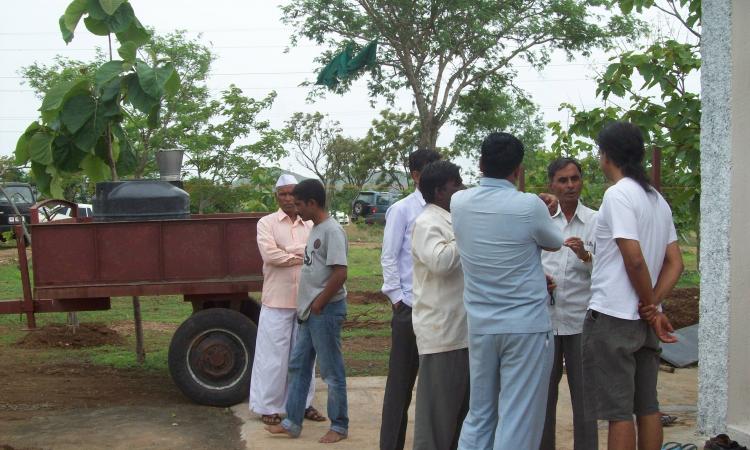
The 1972 drought in Maharashtra affected several villages and talukas. Farmers in Purandhar taluka in Pune district decided to get together and discuss how to improve their situation so that they would not be as severely affected by poor rainfall in the future. Thus was born Pani Panchayat.
Pani Panchayat is a voluntary movement initiated by Late Shri Vilasrao Salunke. An electrical engineer by profession, his concerns around water management got him the popular name of 'Pani baba', which literally translates to 'Father of water'. As part of this movement, various initiatives such as afforestation and dairy farming took shape to bring in more people into the movement. It is around this time that people started realizing the importance of naturally storing water by creating watersheds, which became a means to cope with dry spells.
Over the past few years, the movement has gained recognition among farmers who have come together to share their experiences and experiments on farm land. They have formed a resource pool, which attracts farmers from all walks of life. Their meetings are held once in two months. Once such meeting, held two weeks ago, focussed on various issues such as seed quality - organic versus bio-engineered seeds and its impact, water management - reusing of waste water, techniques to manage land and other resources, and many other things.
The farmers spent more than 10 hours on each day of the meeting to understand various issues that they all respectively faced. One interesting topic that was discussed was the use of bamboo as an alternate to concrete in construction. Bamboo can be used to make sheds that require little maintenance and don't cost a lot. A toilet block made out of bamboo costs an approx of Rs. 2500 and takes lesser time to build than one built with concrete. Water tanks can be built using a combination of concrete and bamboo to give it more strength. Bamboo is also a good substitute for concrete to make false ceilings.
A second session followed where the farmers interacted with their respective Gram Panchayats on issues that concern them. While farmers have access to their Gram Panchayat representatives at all times, they are not familiar with the soft skills necessary to converse with government officials. The Pani Panchayat helps them with this in addition to being a resource for technical know-how.
The farmers then debated and discussed the proposed Biotechnology Regulatory Authority of India (BRAI) bill and various genetically modified (GM) crops such as Bt corn and Bt cotton. The movie - So shall you reap, which shows the ill-effects of GM crops was screened. It elaborated on the implications of using bio-engineered seeds. In one of the incidences, the use of such seeds led to severe rashes for the laborers. Technicalities such as how the seed are created, their side effects and experiences from other places were discussed in detail. This helped the farmers make an informed choice. Some of the farmers expressed that the seeds ended up destroying the crops over a period of time and were shocked to see the label of ‘not fit for human use’ on the covers.
The meeting ended with a discussion of the project that the Pani Panchayat undertook in Purandhar Taluk. They constructed small lakes to collect water and recharge the water table below. Farmers whose land fell under this area, came in and worked on creating these small lakes and ponds. In addition to building these structures, they also pitched in a huge amount of Rs 5.2 lakh collectively. After the rainfall, the farm lands have improved access to water for irrigation. The video below has more information on the project.
Their meetings are open to all. You can get more information by calling 09970469191 or emailing ggp@accurategauging.com.
/articles/making-leaders-out-farmers